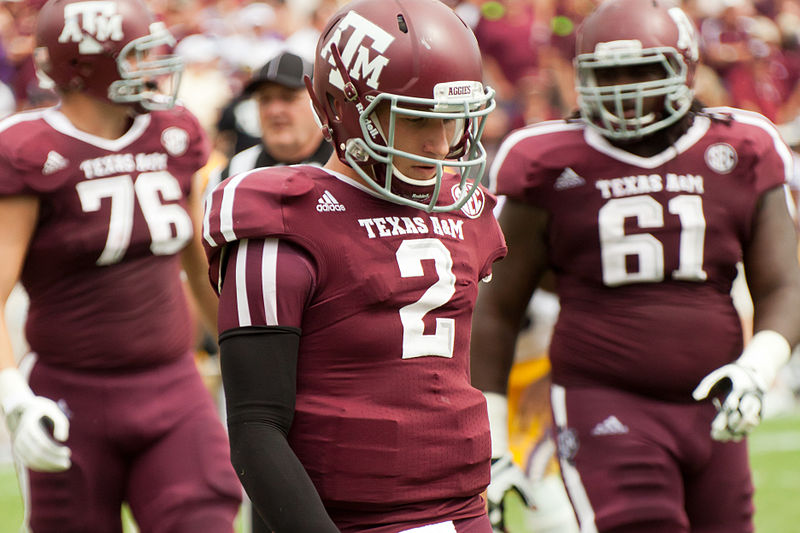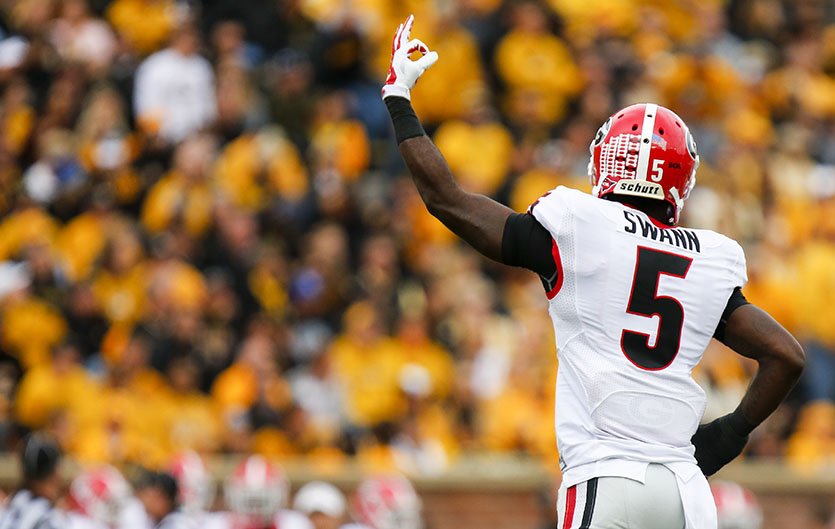By: Taryn Winston 
If you are tired of hearing Johnny Manziel’s name by now, rest assured. You are not alone.
Ever since the twenty-year-old Texan trumped the almighty Crimson Tide and hoisted the Heisman trophy, the media just can’t seem to get enough of “Johnny Football”. He is young, handsome, and destined for a bright future in the NFL. His face has become a regular on the likes of Sports Illustrated and ESPN. And of course, he is pretty good on the football field too, having already broken several NCAA records. Not bad for a guy who is not even old enough to enjoy a celebratory glass of champagne just yet.
But before you turn green with envy, it has not exactly been a smooth ride for the Texas A&M quarterback. Drunken bar fights and an unexplained departure at a high school football camp are among several incidents that have tarnished his image. Yet perhaps the biggest controversy Manziel has been involved in to date is an ongoing NCAA investigation into whether or not he accepted payments from autographs he signed in early 2013. NCAA rules forbid student-athletes from “accepting money for promoting or advertising the commercial sale of a product of service.” Should Manziel be found in violation of this provision, the NCAA could deem him ineligible for the season.
While Johnny Football has certainly been the center of controversy lately, his alleged involvement in this scandal is actually drawing up more support than criticism. From big-time athletes such as Adrian Peterson and Dez Bryant to country superstars to the Texas A&M Chancellor himself, it seems as if almost everybody is backing up Manziel in his latest fight against the big, bad NCAA. As a result, an age-old debate concerning whether or not student-athletes should be compensated for their individual earnings has been revived and revamped. And though we have seen this scenario played out in the past, it has never built up quite this much momentum and attention.
The NCAA may be running out of time to defend this controversial policy. In 2009, former UCLA basketball player Ed O’Bannon filed suit against the NCAA, EA Sports, and Collegiate Licensing Co., arguing that they collectively violated antitrust laws by preventing players from receiving compensation from products that use their name, image, and likenesses. Last year, the lawsuit was amended to include active players. As of July 2013, six current players have added their names to the potentially groundbreaking suit.
Though some continue to back the NCAA (“A scholarship and free tuition is their payment! What else do they want?”), the general consensus is that the provision is morally and even legally wrong. The fact of the matter is that while college athletes are worth six figures, they live well below the federal poverty line. And if that doesn’t make your blood boil, take a look at the eye-popping salaries of Alabama’s Nick Saban and Texas’ Mack Brown. Had enough?
Thus, the real debate is not whether or not college athletes should receive compensation for their individual earnings, but rather how they should receive compensation.
The straightforward answer to this tricky question is to allow student-athletes to accept payments for anything that uses their name, image, or likeness. In other words, if they sign it, they alone may reap the benefits from it. Simple, yes. Smart? Not so much. In fact, giving college athletes unlimited access to their earnings could produce disastrous results including reducing the incentive to graduate. The graduation rate for student-athletes is dismally low as it is; so then what’s the incentive to earn a degree if they are already making an exorbitant amount of money? Another problem arises from the issue of money-management. In 2012, ESPN produced a 30 for 30 documentary entitled “Broke,” in which several retired professional athletes recount bad decisions and bad investments that led them to the brink of bankruptcy. If grown adults struggle managing their own fortunes, imagine giving that responsibility to eighteen and nineteen-year-olds!
Perhaps a more sensible solution would be to set up temporary trust funds for college athletes–an idea first proposed in the pending NCAA lawsuit. Under this proposal, all money earned from television, video games, and other products would be “temporarily held in trust for those individuals until cessation of their collegiate careers.” As a result, college athletes will have more incentive to graduate and collect what they have rightfully earned. While earning a fortune may not be an issue for collegiate superstars such as Manziel and Georgia’s Aaron Murray, too many others leave their respective universities without a degree and in financial disarray. Thus, giving them access to their earnings after college would eliminate several of the issues they currently face.
To all those growing sick at the sight of young Johnny Football popping up on your television screen, try your best to stay calm. It does not look like he or this fight against the NCAA will go away anytime soon. But this time, maybe that is not such a bad thing. While other players have faced similar circumstances (Georgia fans may recall A.J. Green’s suspension for selling his own jersey), Manziel’s high-profile name and reputation has raised the stakes and the pressure on the NCAA.
The NCAA’s greed and hypocrisy has carried on for long enough. In the words of the former bombastic Chicago Bears coach, Dennis Green, “they are who we thought they were!”
Only this time, the NCAA is not getting off the hook.


